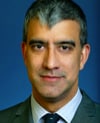Global Winner
Deutsche Bank
Deutsche Bank has the biggest, most diversified and most profitable foreign exchange operation in the world. “The critical factor is that we are excellent across the board—by client type, by region and by products,” says Kevin Rodgers, global head of FX derivatives. “We are good at everything.”

“A bigger and bigger percentage of the trading flow is done online”
“We believe the FX derivatives markets will go the same way, after a delay because they are more complicated and require different technology” – Kevin Rodgers, Deutsche Bank
Deutsche Bank’s customers faced fresh market challenges in 2010, as the market’s attention turned to sovereign, rather than institutional debt; technology continued to advance; and investors focused on emerging markets. “We are entering a period when foreign exchange is front-and-center for both funds and corporations,” Rodgers says. From 2001 until 2007, FX volatility was relatively low and it was easy to hedge, he says. Since the global financial crisis, however, moves in FX rates have been extremely dramatic. Imbalances in the world economy have increasingly played out in the FX market, Rodgers says.
Providing customized solutions to its clients has long been a core part of Deutsche Bank’s strategy. The bank was one of the first banks to invest heavily on the spot side of the FX business in the belief that electronic trading was here to stay. “A bigger and bigger percentage of the trading flow is done online,” Rodgers says. “We believe the FX derivatives markets will go the same way, after a delay because they are more complicated and require different technology.”
Deutsche Bank has allocated an even bigger proportion of its budget to the development and introduction of new tools that clients can use on their desktop computers. “This was supported by a large investment in pricing technology and by an organizational approach which we believe is unique,” Rodgers says. The bank’s e-commerce team is ring-fenced from the main trading teams and handles all e-commerce-related flows in separate books. “Since pricing is separated from the main books, we have been able to concentrate an enormous amount of attention on automated pricing,” Rodgers says.
Deutsche Bank realized that demand for emerging market FX derivatives would grow significantly in 2010, as investors and multinationals increased their exposure in Asia and Latin America. It expanded its trading teams and integrated its emerging market options traders into the FX franchise.




